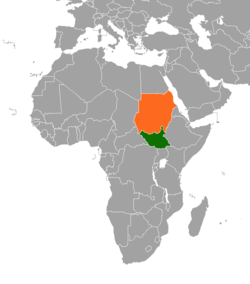
Sudan, officially the Republic of the Sudan, is a country in Northeast Africa. It borders the Central African Republic to the southwest, Chad to the west, Egypt to the north, Eritrea to the northeast, Ethiopia to the southeast, Libya to the northwest, South Sudan to the south, and the Red Sea. It has a population of 45.7 million people as of 2022 and occupies 1,886,068 square kilometres, making it Africa's third-largest country by area and the third-largest by area in the Arab League. It was the largest country by area in Africa and the Arab League until the secession of South Sudan in 2011; since then both titles have been held by Algeria. Its capital and most populous city is Khartoum.

Currently, the politics of Sudan takes place in the framework of a federal provisional government. Previously, a president was head of state, head of government, and commander-in-chief of the Sudanese Armed Forces in a de jure multi-party system. Legislative power was officially vested in both the government and in the two chambers, the National Assembly (lower) and the Council of States (higher), of the bicameral National Legislature. The judiciary is independent and obtained by the Constitutional Court. However, following a deadly civil war and the still ongoing genocide in Darfur, Sudan was widely recognized as a totalitarian state where all effective political power was held by President Omar al-Bashir and his National Congress Party (NCP). However, al-Bashir and the NCP were ousted in a military coup which occurred on April 11, 2019. The government of Sudan was then led by the Transitional Military Council or TMC. On 20 August 2019, the TMC dissolved giving its authority over to the Sovereignty Council of Sudan, who were planned to govern for 39 months until 2022, in the process of transitioning to democracy. However, the Sovereignty Council and the Sudanese government were dissolved in October 2021.

Omar Hassan Ahmad al-Bashir is a Sudanese former military officer and politician who served as Sudan's head of state under various titles from 1989 until 2019, when he was deposed in a coup d'état. He was subsequently incarcerated, tried and convicted on multiple corruption charges. He came to power in 1989 when, as a brigadier general in the Sudanese Army, he led a group of officers in a military coup that ousted the democratically elected government of prime minister Sadiq al-Mahdi after it began negotiations with rebels in the south; he subsequently replaced President Ahmed al-Mirghani as head of state. He was elected three times as president in elections that have been under scrutiny for electoral fraud. In 1992, al-Bashir founded the National Congress Party, which remained the dominant political party in the country until 2019. In March 2009, al-Bashir became the first sitting head of state to be indicted by the International Criminal Court (ICC), for allegedly directing a campaign of mass killing, rape, and pillage against civilians in Darfur. On 11 February 2020, the Government of Sudan announced that it had agreed to hand over al-Bashir to the ICC for trial.

Below is a list of the 18 states of the Sudan. Prior to 9 July 2011, the Republic of the Sudan was composed of 25 states. The ten southern states now form part of the independent country of South Sudan. Two additional states were created in 2012 within the Darfur region, and one in 2013 in Kordofan, bringing the total to 18.
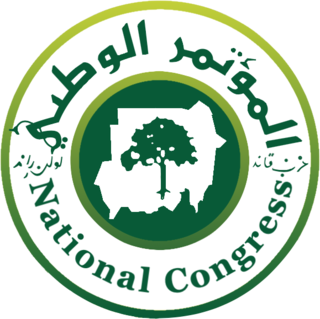
The National Congress Party was a major political party that dominated domestic politics in Sudan from its foundation until the Sudanese Revolution.

This article covers the period of the history of Sudan between 1985 and 2019 when the Sudanese Defense Minister Abdel Rahman Swar al-Dahab seized power from Sudanese President Gaafar Nimeiry in the 1985 Sudanese coup d'état. Not long after, Lieutenant General Omar al-Bashir, backed by an Islamist political party, the National Islamic Front, overthrew the short lived government in a coup in 1989 where he ruled as President until his fall in April 2019. During Bashir's rule, also referred to as Bashirist Sudan, or as they called themselves the al-Ingaz regime, he was re-elected three times while overseeing the independence of South Sudan in 2011. His regime was criticized for human rights abuses, atrocities and genocide in Darfur and allegations of harboring and supporting terrorist groups in the region while being subjected to United Nations sanctions beginning in 1995, resulting in Sudan's isolation as an international pariah.

A referendum took place in Southern Sudan from 9 to 15 January 2011, on whether the region should remain a part of Sudan or become independent. The referendum was one of the consequences of the 2005 Naivasha Agreement between the Khartoum central government and the Sudan People's Liberation Army/Movement (SPLA/M).

The Abyei Area is an area of 10,546 km2 or 4,072 sq mi on the border between South Sudan and Sudan that has been accorded "special administrative status" by the 2004 Protocol on the Resolution of the Abyei Conflict in the Comprehensive Peace Agreement (CPA) that ended the Second Sudanese Civil War. The capital of the Abyei Area is Abyei Town. Under the terms of the Abyei Protocol, the Abyei Area is considered, on an interim basis, to be simultaneously part of both the Republic of South Sudan and Republic of Sudan, effectively a condominium.

The Comprehensive Peace Agreement, also known as the Naivasha Agreement, was an accord signed on 9 January 2005, by the Sudan People's Liberation Movement (SPLM) and the Government of Sudan. The CPA was meant to end the Second Sudanese Civil War, develop democratic governance countrywide, and share oil revenues. It also set a timetable for a Southern Sudanese independence referendum.

China–Sudan relations are the bilateral relations between the People's Republic of China and the Republic of Sudan. China is currently one of Sudan's largest trade partners, importing oil and exporting low cost manufactured items as well as armaments into the country. Both states enjoy a very robust and productive relationship in the fields of diplomacy, economic trade, and political strategy. They formally established diplomatic relations on February 4, 1959, when Sudan formally recognized the sovereignty of the People's Republic of China and have since become close global allies, supporting each other in times of internal crises and international controversy such as during the Second Sudanese Civil War, the Darfur Crisis, and the Xinjiang Conflict. China continues to provide massive support to Sudan by developing its oil resources and supplying millions of dollars in loans, aid, foreign direct investments, and humanitarian assistance. In return, Sudan has become a reliable political and economic ally in the international arena, allowing China to maintain a significant stake in its oil sector.

Sudan–United Kingdom relations are foreign relations between Sudan and the United Kingdom. Sudan has an embassy in London whilst the United Kingdom has an embassy in Khartoum. Most of the recent relations between the two countries centre on the region of Darfur.
The Abyei status referendum is a delayed referendum that was originally due to be held in 2011 in which the residents of Abyei can decide either to remain part of the Sudanese South Kordofan region or to become part of the Bahr el Ghazal region of South Sudan.

Southern Sudan was an autonomous region consisting of the ten southern states of Sudan between its formation in July 2005 and independence as the Republic of South Sudan in July 2011. The autonomous government was initially established in Rumbek and later moved to Juba. It was bordered by Ethiopia to the east; Kenya, Uganda, and the Democratic Republic of the Congo to the south; and the Central African Republic to the west. To the north lies the predominantly Arab and Muslim region directly under the control of the central government. The region's autonomous status was a condition of a peace agreement between the Sudan People's Liberation Army/Movement (SPLA/M) and the Government of Sudan represented by the National Congress Party ending the Second Sudanese Civil War. The conflict was Africa's longest running civil war.

The Sudanese conflict in South Kordofan and Blue Nile was an armed conflict in the Sudanese states of South Kordofan and Blue Nile between the Sudanese Armed Forces (SAF) and the Sudan People's Liberation Movement–North (SPLM-N), a northern affiliate of the Sudan People's Liberation Movement (SPLM) in South Sudan. After some years of relative calm following the 2005 agreement which ended the second Sudanese civil war between the Sudanese government and SPLM rebels, fighting broke out again in the lead-up to South Sudan independence on 9 July 2011, starting in South Kordofan on 5 June and spreading to the neighboring Blue Nile state in September. SPLM-N, splitting from newly independent SPLM, took up arms against the inclusion of the two southern states in Sudan with no popular consultation and against the lack of democratic elections. The conflict is intertwined with the War in Darfur, since in November 2011 SPLM-N established a loose alliance with Darfuri rebels, called Sudan Revolutionary Front (SRF).
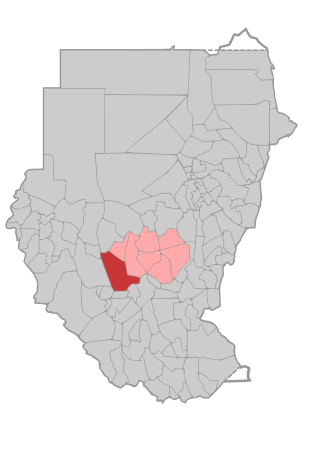
United Nations Security Council Resolution 1990, adopted unanimously on June 27, 2011, after recalling all previous resolutions on the situation in Sudan and the Comprehensive Peace Agreement, the Council established the United Nations Interim Security Force for Abyei (UNISFA) in the disputed Abyei region between Sudan and South Sudan.

The geography of South Sudan describes the physical features of South Sudan, a country in East Africa. South Sudan is a landlocked country and borders – clockwise – Sudan from the north, Ethiopia from the east, Kenya, Uganda and the Democratic Republic of the Congo from the south and the Central African Republic from the west.
The history of South Sudan comprises the history of the territory of present-day South Sudan and the peoples inhabiting the region.
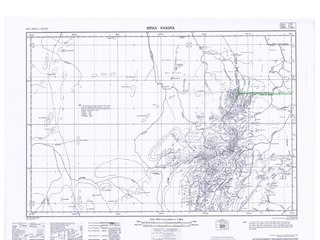
The Kafia Kingi area is a mineral-rich region on the border between Sudan, South Sudan and the Central African Republic. It is disputed between South Sudan and Sudan.
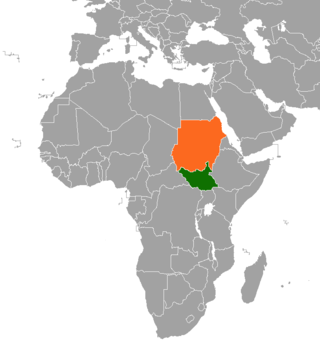
The Heglig Crisis was a brief war fought between the countries of Sudan and South Sudan in 2012 over oil-rich regions between South Sudan's Unity and Sudan's South Kordofan states. South Sudan invaded and briefly occupied the small border town of Heglig before being pushed back by the Sudanese army. Small-scale clashes continued until an agreement on borders and natural resources was signed on 26 September, resolving most aspects of the conflict.
The following lists events that happened during 2011 in Sudan.
